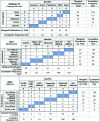Effects of impairment-based exercise on performance of specific self-reported functional tasks in individuals with knee osteoarthritis
- PMID: 22003157
- PMCID: PMC3229042
- DOI: 10.2522/ptj.20100269
Effects of impairment-based exercise on performance of specific self-reported functional tasks in individuals with knee osteoarthritis
Abstract
Background: Little is known regarding how impairment-based exercises may improve performance of specific functional tasks in people with knee osteoarthritis (OA).
Objective: The purpose of this study was to compare the probability that participation in an impairment-based exercise program or the same impairment-based program supplemented with agility and perturbation training will improve patient-reported function on specific functional tasks.
Design: This study was a secondary analysis of data from a randomized clinical trial.
Setting: The study was conducted in the outpatient physical therapy clinic of a large, university-based health center.
Participants: One hundred eighty-three people with knee OA (122 women, 61 men) participated.
Interventions: Participants were randomly assigned to either a group that received agility and perturbation training with standard exercise therapy or a group that received only the standard exercise.
Measurements: Specific functional items were taken from the physical function subscale of the Western Ontario and McMasters Universities Osteoarthritis Index, the Lower Extremity Function Scale, and the Activities of Daily Living Scale of the Knee Outcome Survey.
Results: The probability of self-reported improvement in a variety of specific functional tasks was low following participation in either of the exercise programs. When only participants with moderate to severe difficulty performing specific functional tasks were considered in the analysis, the probability of success improved but was still limited.
Limitations: The results are generalizable only to self-reported assessment of performance of specific functional tasks.
Conclusions: Impairment-based exercise may not be enough to make substantial improvement in performance of specific functional tasks. Task-specific exercise approaches need to be explored for people with knee OA.
Trial registration: ClinicalTrials.gov NCT00078624.
Figures



References
-
- Zhang W, Moskowitz RW, Nuki G, et al. OARSI recommendations for the management of hip and knee osteoarthritis, part II: OARSI evidence-based, expert consensus guidelines. Osteoarthritis Cartilage. 2008;16:137–162 - PubMed
-
- Ottawa Panel Evidence-Based Clinical Practice Guidelines for Therapeutic Exercises and Manual Therapy in the Management of Osteoarthritis. Phys Ther. 2005;85:907–971 - PubMed
-
- American College of Rheumatology Subcommittee on Osteoarthritis Guidelines Recommendations for the medical management of osteoarthritis of the hip and knee: 2000 update. Arthritis Rheum. 2000;43:1905–1915 - PubMed
-
- Rogind H, Bibow-Nielsen B, Jensen B, et al. The effects of a physical training program on patients with osteoarthritis of the knees. Arch Phys Med Rehabil. 1998;79:1421–1427 - PubMed
Publication types
MeSH terms
Associated data
Grants and funding
LinkOut - more resources
Full Text Sources
Medical

